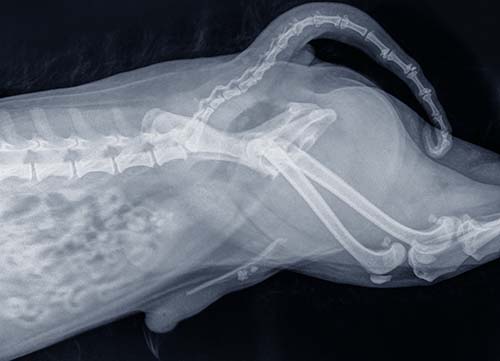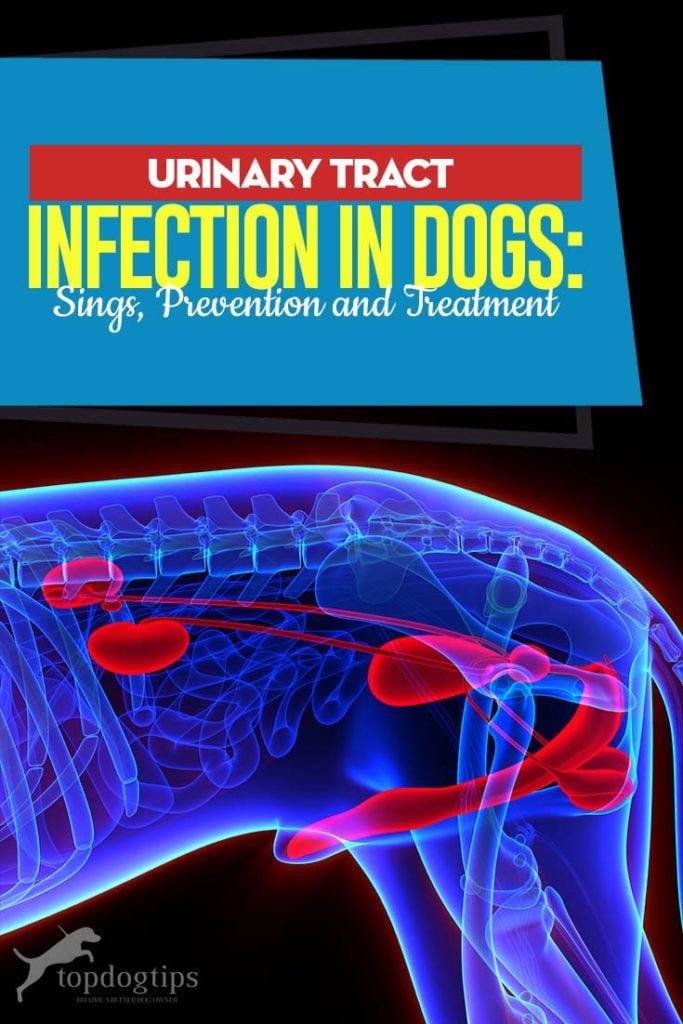Table of Contents
Bacterial urinary tract infection in dogs is often asymptomatic.
Unfortunately, we pet owners will only notice it when the animal asks to go outside more often than usual and/, or the dog eventually starts ignoring all housebreaking training.
It's a fairly common condition in all dogs and generally can be easily treated. Here's everything you should know about it.

The Signs of a UTI in Dogs
Urinary tract infection (UTI) is more common in female dogs and canines that suffer from diabetes, Cushing’s disease, or chronic kidney issues (1).
In one study, the incidence of UTIs was observed in 26.6% of female dogs and only 6.2% of male dogs (2).
However, all dogs of any age, gender, or breed are susceptible to this bacterial infection.
In fact, UTIs are one of the most common infections in canines, with veterinarians seeing them in 14% of the dog population (3).
Urinary tract infection in dogs is easily treated, and most pets bounce back to their normal self within 1-2 weeks (4).
However, when it's not diagnosed promptly and untreated accordingly, the lower urinary infection can spread to the dog's vital organs such as kidneys, causing renal disease and complicating the situation (5).
Furthermore, symptoms of UTI in dogs mimic symptoms of several other more serious medical conditions, including but not limited to organ failure and cancer (6).
It’s important not to take any of the following symptoms lightly:
- Excessive thirst
- Uncontrollable bladder
- Bloody urine
- Foul-smelling urine
- Cloudy and/or dark urine
- Excessive licking of genitals
- Lack of appetite
- Sluggishness
- Fever (99.5 – 102.5)
- Apathy and disinterest in usual hobbies
- Painful or strained urination
What Causes a Urinary Tract Infection in Dogs?
Even a healthy, frequently cleaned dog can develop a UTI. The infection is most often the result of bacteria surrounding the dog's genitals or when foreign debris gathered from rolling around outdoors travels up the dog's urethra and affects their bladder (7).
Certain treatments of other illnesses, such as corticosteroids, also increased the risk of UTI development in dogs (8).
Pet owner's inattention to the infection gives it time to travel up and into the dog's kidneys, causing further and more serious health issues, such as excruciating kidney stones, which then may result in kidney failure (9)
A weakened immune system, whether due to battling another illness simultaneously or being a young puppy that’s not fully developed or a vulnerable geriatric dog, can make it more difficult for the dog's body to fight off the urinary infection (10).
How to Prevent A Urinary Tract Infection in Dogs
The best preventative method for urinary tract infection in dogs is a healthy routine and regular vet check-ups.
This also means routine grooming and bathing the dog and ensuring the animal has plenty of water to drink and enough opportunities to relieve themselves.
Hydration and frequent potty breaks
Dogs who cannot go outside at least every 8 hours are forced to put a strain on their bladder while holding it in, which results in bacteria accumulating in the dog's urinary system without being released, thus becoming a breeding ground for infection.
Hygiene routine
Give your pet a much-needed bath on a set schedule. Dogs create natural oils which help protect their skin and hair.
On the other hand, bathing too often is also a bad idea because washing the dog's hair too frequently can strip these oils, causing dry, irritated skin, which weakens what would've been a barrier for infection (11, 12).
Bath your dog or take them to a groomer only as needed (after a romp in the mud and rain or just when they begin to become particularly smelly).
Animal-approved soaps and dog shampoos that are safe for your pet are perfect for rinsing intimate areas, which, no matter their protests, should definitely be attended to.
As far as the rest of dog grooming goes, breeds with shaggier, you should trim wilder manes around the genital and anal areas. This will help mitigate any infections due to matted, soiled fur coming into contact with the urethra.
Veterinary Care of Urinary Tract Infection in Dogs
If you suspect a urinary tract infection in your dog, a veterinarian should be your first point of contact.
A professional will be able to determine if it’s really a UTI that’s occurring or not and thus be able to take the appropriate steps to treat and healing the issue.
During the initial appointment, your vet will request a sample of the dog's urine sent out for lab results, usually available within a day or two.
During testing, the staff is looking for culture levels to indicate how severe the urinary infection is.
High concentrations may indicate pyelonephritis, otherwise known as a kidney infection in dogs.
Whether the result (severe or not), the urine sample will help the veterinary staff determine exactly which kind of antibiotic to prescribe your ailing pup, as UTI in dogs can be caused by a variety of bacterium (13, 14).
Fluoroquinolones are most commonly used to treat UTIs in people and dogs (15, 16). Enrofloxacin is a type of fluoroquinolone medicine made for dogs with UTI, and its general approved dosage is from 5 to 20 mg/kg PO q24h (17, 18).
Veterinarians prescribe antibiotics that will help flood urine with antimicrobials, which will act as a flushing agent, ridding the dog's body of infection whenever the dog pees (19). Due to this, it’s likely the medication will make your dog urinate regularly.
The treatment is likely to last from 7 to 14 days (20, 21).
If you have a job that requires your attention and isn’t able to stay home to let your dog outside for bathroom breaks routinely, it's recommended to use pee pads and/or hiring a dog sitter or walker, and/or enlist the help of a trusted friend or neighbor.
Some pet owners may be familiar with the signs of urinary tract infection in dogs and think they can treat it themselves, skipping a bill from the vet.
However, in addition to the fact that UTI in dogs' symptoms mimics serious health conditions, UTIs (as discussed) are created and affected by different forms of bacteria treated differently.
For example, a dog owner may know to give their dog sugar-free cranberry concentrate to treat a UTI, but this will only be effective if they administer the correct dosage based on their dog’s age and weight.
This is effective only if the dog's UTI was caused specifically by E. coli bacterium (22, 23). Any other bacteria will not respond to cranberry concentrate.
At-Home Care of Urinary Tract Infection in Dogs
If possible, always consult a veterinarian first before attempting any at-home care and home remedies for urinary tract infections in dogs.
Pets and their owners are best helped through the consultation and advice of a veterinary professional.
Hydration
As your dog fights off the infection, they’ll need all the water they can get. Be sure to monitor your dog's water intake, encouraging them to drink, even to the point of using a plastic syringe to administer water to them if needed.
There are several ways you can encourage your dog to drink more water:
- Place extra water bowls around the house, so your pet constantly runs into them
- Use dog water fountains because constantly running water entices them to drink
- You can also make bone broth, and its smell is likely to make your dog drink
Use of water fountains, additional placement of water bowls around the house, and bone broth could mean the difference between your dog choosing to lap up some much-needed water or deciding that the distance they’d have to waddle to their water bowl in the kitchen is not worth leaving their comfortable napping spot.
Supplements
The best supplements for urinary tract infection in dogs, especially pets with compromised immune systems, should include concentrated Vitamin C, which you can buy in tablet form.
While you continue to follow the vet's instructions and administer antibiotics, be aware that this medicine may inadvertently flush away healthy bacteria from the body.
To counteract that, you can add a dollop of sugar-free, plain Greek yogurt to your dog's nightly meal.
As a probiotic, yogurt is rich in live cultures, which promote healthy bacteria in a dog's gut and have been shown to help with UTI (24).
For even more live cultures and potentially better results, these can also be given as probiotic supplements.
Some of the best supplements for dogs with UTI are those below:
| Preview | Product | Rating | |
|---|---|---|---|

|
Pet Honesty Bladder Health Cranberry Supplement... | 18,092 Reviews | Check Price |

|
Zesty Paws Cranberry Bladder Bites for Dogs -... | 12,322 Reviews | Check Price |

|
Amazing Cranberry for Dogs Pet Antioxidant,... | 4,362 Reviews | Check Price |
Natural foods
Additionally, some fresh and natural healthy herbs, particularly parsley, can be added to your dog’s meals to encourage quicker and smoother recovery (25).
Parsley is a natural antiseptic, making it particularly beneficial for dog urinary tract infections.
Likewise, blueberries and cranberries have been scientifically proven as natural antiseptics (26, 27). Avoid giving your dog store-bought cranberry juice because it’s typically surging with sugars.
Instead, look for cranberry concentrate. Although extremely bitter and tart to the taste, this concentrate is what health care professionals intended for the public to drink, rather than sugary fruit juices, when suffering from UTIs (28).
Top off your dog's water bowl with some cranberry concentrate but be sure to keep their usual water bowl untouched as you want to ensure they’re drinking water and not avoiding it altogether.
Low protein foods and treats
Because UTIs in dogs may be straining your dog's kidneys, a low protein diet can be recommended by a vet to prevent proteinuria.
Studies have shown this type of diet to improve bladder and kidney-related conditions in dogs, making animals feel less lethargic and even extend lifespan in terminally ill dogs (29, 30).
You can switch to low protein foods and treats, but only if approved by your veterinarian.
Some of the best low protein treats and foods are mentioned below:
| Preview | Product | Rating | |
|---|---|---|---|

|
Diamond Pet Foods Naturals Lite - Lamb & Rice - 30... | 1,882 Reviews | Check Price |

|
Mattie's Treats: 1 Pound Box; Low Protein, Low... | 1,649 Reviews | Check Price |

|
Zuke's 61057 Superfood Blend Natural Dog Treats... | 1,610 Reviews | Check Price |

|
Buddy Biscuits Softies 5 oz Pouch, Grain-Free Soft... | 6,087 Reviews | Check Price |
Avoid dog parks and kennels
While your pet has a UTI, the dog's immune system is weakened and is working extra hard to fight off the disease, which means they aren’t at their most fit to take on any more health issues (31).
UTIs aren’t infectious, but other diseases and illnesses are, and they could be easily picked up while surrounded by other dogs, such as in dog boarding facilities or dog parks.
A dog gaining another illness while recovering from a UTI could put a serious strain on their body, decreasing the chance of fast recovery.
Avoid excessive exercise
Like with cases of many other health issues, you should shorten long playtimes in the park or backyard until the dog's health is restored.
Strenuous exercise only serves to dehydrate your pup further, no matter how fun they are.
It also weakens the dog's immune system, and your pet needs it to be in top shape, so take some time off.
Avoid sugars
While you should do this for your pet’s health already, it’s essential to pay attention to how much sugar your dog consumes while they recover from UTI.
Whether they’re from carb-loaded dog treats or table scraps, Sugars will only serve to grow the infection by feeding the bacteria (32).
Instead of artificial sugary treats, opt for single-ingredient healthy treats or nutrient-rich foods like chicken broth for hydration, dog-safe vegetables, lean and hearty proteins like shredded chicken or turkey.
Mix these with pureed pumpkin and coconut oil to create a healthy goulash.
Pumpkin is especially great for the dog's digestive health, while coconut oil is a natural antiseptic and anti-inflammatory for urinary tract infections in dogs.
UTIs in Dogs: Wrapping Up
Now you see that its important to keep an eye on your little girl or boy's bathroom habits. A UTI in dogs just like with us, isn't a huge concern at first, but MUST be addressed to keep it from progressing into a worse infection.
Regardless, of which gender it is if you own a dog, there's a solid chance that you will be dealing with this at least once in your dog's life.
My dog is coming up on two years old and it has already happened. It wasn't a big deal because I caught it early on.
Fortunately, urinary tract infections in dogs can quickly be treated by taking them to your vet which is what I did.
If you want to take the risk and treat it yourself, go ahead, I didn't want to take the risk because I didn't want it to turn into a bladder infection. A bladder infection in dogs can be worse to deal with and progress to something like renal disease.
Now you are prepared for the worst and know exactly how to handle this scenario when it comes. Let us know which method worked the best for you. If you tried a home remedy, feel free to share with our community, so you can help others!
READ NEXT: 15 Best Low Protein Dog Food Brands for Kidney Health
Disclosure: We may earn affiliate commissions at no cost to you from the links on this page. This did not affect our assessment of products. Read more here and find full disclosure here.

















